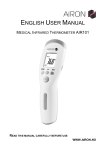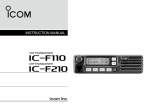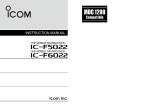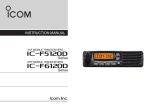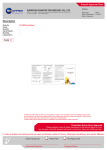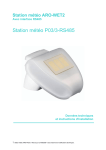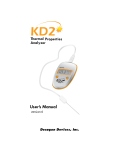Download High-Speed USB 2.0 Docking Station User`s Manual
Transcript
High-Speed USB 2.0 Docking Station User’s Manual High-Speed USB 2.0 Docking Station ABOUT THIS MANUAL This manual is designed for use with the High-Speed USB 2.0 Docking Station. Information in this document has been carefully checked for accuracy; however, no guarantee is given to the correctness of the contents. The information in this document is subject to change without notice. The manufacturer does not make any representations or warranties (implied or otherwise) regarding the accuracy and completeness of this document and shall in no event be liable for any loss of profit or any commercial damage, including but not limited to special, incidental, consequential, or other damage. SAFETY INSTRUCTIONS Always read the safety instructions carefully: Keep this User’s Manual for future reference Keep this equipment away from humidity If any of the following situation arises, get the equipment checked by a service technician: z The equipment has been dropped and damaged. z The equipment has obvious sign of breakage. z The equipment has not been working well or you cannot get it to work according to the User’s Manual. COPYRIGHT This document contains proprietary information protected by copyright. All right are reserved. No part of this manual may be reproduced by any mechanical, electronic or other means, in any form, without prior written permission of the manufacturer. TRADEMARKS All trademarks and registered trademarks are the property of their respective owners or companies. i Table of Contents Table of Contents 1. Introduction .......................................................................................................1 Features..............................................................................................................2 Package Contents...............................................................................................2 System Requirements.........................................................................................2 LED Status..........................................................................................................2 2. Installation .........................................................................................................3 On Windows 2000 ..............................................................................................3 On Windows XP..................................................................................................5 On Windows Vista...............................................................................................7 Connecting the Docking Station ..........................................................................9 Checking Device Installation .............................................................................10 Self-Power Mode vs Bus-Power Mode ............................................................. 11 3. Operation Notes About the Ports...................................................................12 4.Specifications...................................................................................................13 5. Regulatory Compliance ..................................................................................15 FCC Conditions ................................................................................................15 CE.....................................................................................................................15 WEEE Information ............................................................................................15 ii High-Speed USB 2.0 Docking Station 1. Introduction This USB 2.0 Docking Station is a unique expansion unit specially designed to accompany notebook or desktop PC, which has extra connectivity demands. With only one USB port required from a notebook/desktop PC, not only USB but also conventional RS-232 serial port, Stereo output port, LAN peripheral devices can be accessed freely. The USB 2.0 Docking Station allows you to add multiple high-performance USB 2.0 peripheral devices to your PC. Moreover, this product is fully backwards compatible with the USB Revision 1.1 products, which means your previous USB 1.1 devices can continue to function as well. You also can add additional hubs and devices of up to 127 devices. 1 High-Speed USB 2.0 Docking Station Features Connect your notebook to your peripherals with just one USB plug Four spaced USB 2.0 ports allow you to connect multiple USB devices such as printer, external Hard Drive. 10/100 Ethernet port allows you to maintain an Internet connection and avoid wireless hang-up. Stereo output port allows connection of stereo or 2.1 speaker systems. Connect your Internet chat headset with the Microphone In port and Stereo Output port. RS-232 serial ports - allows you to connect to a serial devices such as touch screens and barcode scanners. Fully compliant with plug & play and host swapping. Supports self-power and bus-power mode. Package Contents High-Speed USB 2.0 Docking Station x1 Power Adapter x1 USB 2.0 cable x1 CD (Driver & User’ Manual) x1 Quick Installation Guide x1 System Requirements Windows® 2000 / XP / Vista LED Status LED Color Description Power Orange Lights up when the docking station is powered on. USB Hub Green Lights up when ready to connect to a USB device. LAN Green Lights up when connection to a 10/100Mbps network. Blinking when there is data flow between LAN and the host computer. 2 High-Speed USB 2.0 Docking Station 2. Installation On Windows 2000 Caution: DO NOT connect the High-Speed USB 2.0 docking station to your computer before you install the provided driver. You will be instructed to do so later. 1. Insert the provided CD into your disc drive and the installer program will run automatically when the High-Speed USB 2.0 Docking Station CD is inserted, and your may see the screen as below. Please click Install to start the Driver install. If the installer program doesn’t run automatically, please locate and double-click on the Autorun.exe file in the CD to launch the install program. 3 High-Speed USB 2.0 Docking Station 2. When you see the screen as below, please click on Install to continue install process. 3. Please click on Finish to complete the installation of High-Speed USB 2.0 Docking Station.. 4 High-Speed USB 2.0 Docking Station On Windows XP Caution: DO NOT connect the High-Speed USB 2.0 docking station to your computer before you install the provided driver. You will be instructed to do so later. 1. Insert the provided CD into your disc drive and the installer program will run automatically when the High-Speed USB 2.0 Docking Station CD is inserted, and your may see the screen as below. Please click Install to start the Driver install. If the installer program doesn’t run automatically, please locate and double-click on the Autorun.exe file in the CD to launch the install program. 5 High-Speed USB 2.0 Docking Station 2. When you see the screen as below, please click on Install to continue install process. 3. Please click on Finish to complete the installation of High-Speed USB 2.0 Docking Station.. 6 High-Speed USB 2.0 Docking Station On Windows Vista Caution: DO NOT connect the High-Speed USB 2.0 docking station to your computer before you install the provided driver. You will be instructed to do so later. 1. Insert the provided CD into your disc drive and installer program will run automatically when the High-Speed USB 2.0 Docking Station CD is inserted. Please click on Run Autorun.exe to execute the installer program. If the installer program doesn’t run automatically, please locate and double-click on the Autorun.exe file in the CD to launch the install program. 2. When you see the InstallShield Wizard for Wireless USB Hub screen as below, just click on Next anyway. 7 High-Speed USB 2.0 Docking Station 3. When you see the screen as below, please click on Install to continue install process. 4. Please click on Finish to complete the installation of High-Speed USB 2.0 Docking Station.. 8 High-Speed USB 2.0 Docking Station Connecting the Docking Station After installing the software, proceed as follows to connect the device: 1. Plug the square end (Type B male receptacle) of the USB cable into the USB upstream connector located on the side of docking station. 2. Plug the flat end (Type A male receptacle) of the USB cable into a free USB port on your computer. 3. (Optional) Plug the power adapter to a household AC outlet and plug the adapter’s DC jack into the DC socket on the side of docking station. * The docking station supports both self-power mode and bus-power mode. Refer to the “Self-Power Mode vs Bus-Power Mode” section for details. Power DC Jack USB Type B Female Port USB Type A Female Port Audio Out Audio In RJ-45 Ethernet Port DB-9 Serial Port 9 High-Speed USB 2.0 Docking Station Checking Device Installation Once you finish the installation, you can open Windows Device Manager (via My Computer > Properties > Hardware) to verify if your docking station is properly installed with all the provided functions. There should be a couple of device entries added to the device list as shown below: LAN port * For LAN port within model Serial port Audio Device USB hub (2 or 4 ports) * Actual strings depend on your operation system. These screen shots are from Windows Vista and might vary slightly for each operation system. 10 High-Speed USB 2.0 Docking Station Self-Power Mode vs Bus-Power Mode Note that there are two modes of powering USB peripherals, self-power mode and bus-power mode. The self-power mode means the peripheral has its own power adapter for operation. Bus-power mode means the peripheral operates under the power from the upstream port that it is connected to. The USB 2.0 docking station can operate under both USB bus-power and self-power mode. However, under bus-power mode, each downstream facing port of the docking station cannot supply current for more than 100mA. Therefore, devices (e.g. USB scanner or multi-function peripheral, MFP) with power demand higher than this value cannot function. In this situation, it is recommended to operate this docking station under self-power mode whenever possible. USB bus-power mode is only for low power consumption devices. 11 High-Speed USB 2.0 Docking Station 3. Operation Notes About the Ports When connecting peripheral devices to the docking station, pay attention to the following notes: LAN Port: This port supports Ethernet 10/100 Mbps function. Audio In/Out port: This port supports audio out (Earphone) & audio In (Microphone) function. USB Hub Ports: When connecting a USB device to one of the downstream USB ports of the docking station, make sure to follow the software installation manual accompanied (if any) with this USB device. Serial Port: Note that serial port is not a plug and play interface. If you connect a serial port device (e.g. a modem) to the docking station and the docking station is connected to a PC already, you need to perform the Add New Hardware function from the Control Panel or remove and re-plug the docking station to the PC to find the device and perform the function. USB-to-serial interface: The interface was designed to work with modems or any serial device that has drivers capable of handling “VIRTUAL PORT”. The mice of serial type are old devices and most of their drivers recognize physical serial ports only. Thus, the compatibility of the USB-to-serial interface and the serial mouse is not guaranteed at all. There are rare few cases that it can work, but for the majority of the serial mice, they are not compatible with the USB-to-serial interface. 12 High-Speed USB 2.0 Docking Station 4.Specifications General Host Interface USB 2.0 Operating System Support Windows® 2000 / XP / Vista Ports and Connectors Upstream 1 x USB Type B Female Connector (Color : Black) USB Hub Downstream 4 x USB Type A Female Connector (Color : Black) 1 x Ethernet Port Ethernet (10/100 Base-T Ethernet RJ-45 Female Connector) Serial Port 1 x DB-9 Male (Color : Black) Audio in 1 x 3.5mm Stereo Jack Female (Color : Pink) Audio Audio Out 1 x 3.5mm Stereo Jack Female (Color : Green) Power 1 x DC Jack (Color : Black) LED Power LED (Orange) Lights up when the docking station is powered on. USB Hub LED (Green) Lights up when ready to connect to a USB device. Lights up when connection to a 10/100Mbps network. LAN LED (Green) Blinking when there is data flow between LAN and the host computer. Power Consumption Input AC 100-240V Output DC 5V / 2.5A Power Adapter Power Mode Self-powered & Bus-powered 13 High-Speed USB 2.0 Docking Station Physical Properties Housing Plastic Weight 148g Dimension (LxWxH) 178x58.6x28.7 mm Compliance FCC, CE * Specification is subject to change without further notice. 14 High-Speed USB 2.0 Docking Station 5. Regulatory Compliance FCC Conditions This equipment has been tested and found to comply with Part 15 of the FCC Rules. Operation is subject to the following two conditions: (1) This device may not cause harmful interference (2) This device must accept any interference received. Including interference that may cause undesired operation. CE This equipment is in compliance with the requirements of the following regulations: EN 55 022: CLASS B WEEE Information For EU (European Union) member users: According to the WEEE (Waste electrical and electronic equipment) Directive, do not dispose of this product as household waste or commercial waste. Waste electrical and electronic equipment should be appropriately collected and recycled as required by practices established for your country. For information on recycling of this product, please contact your local authorities, your household waste disposal service or the shop where you purchased the product. 15



















